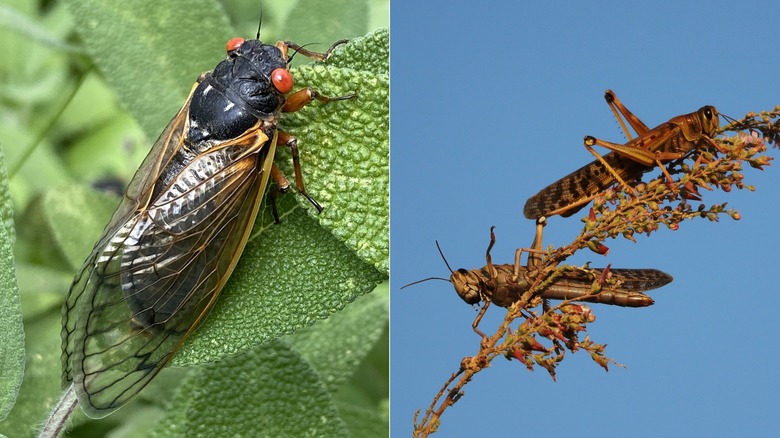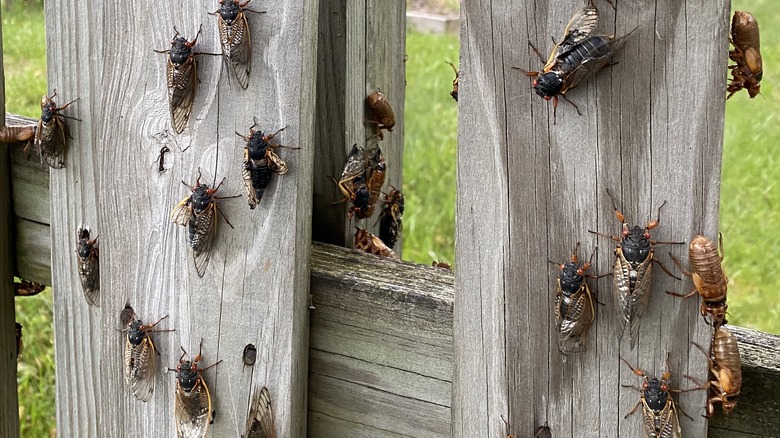Surefire Ways To Tell Whether You're Dealing With Locusts Or Cicadas In Your Yard
You've probably heard that 2024 will be the year of the cicada. For the first time in over 220 years, two legendary periodical cicada broods will emerge at the same time across the eastern half of the United States, taking to the trees to sing their noisy chorus that lasts well into summer. The great cicada emergence officially kicked off at the end of April, and many people have seen this wave of bugs in their backyard. However, if you aren't familiar with cicadas, you might confuse them for locusts. Although they can share some similar traits, these two insect families couldn't be more different.
In short, cicadas have rounded, winged bodies and big eyes, while locusts are a type of grasshopper. Cicadas and locusts also have unique life cycles and their effects on landscaping and gardens vary greatly. Besides these differences, there's one absolutely surefire way to know which insect is in your yard — your location. If you live in North America, you're dealing with cicadas, not locusts, as the latter is only found in other parts of the world. Here's more on the differences between cicadas and locusts and tips for dealing with an onslaught of cicadas, whether you like them or not.
North American cicadas are rounder and louder
There are about 190 species of cicadas that live in North America, but in general these bugs can be easily identified by their bulky, rounded bodies, beady side-set eyes, and large, transparent wings. Cicadas belong to the Hemiptera order with aphids, "true" bugs, and assassin beetles. Annual cicadas have a two to three year life cycle, while periodical cicadas emerge much less frequently. Cicada eggs hatch in the trees, then young cicadas live underground for a period of 13 or 17 years, depending on the brood. When these cicadas dig their way out of the ground and return to the trees, males vibrate their abdomens to produce a mating call that can sound louder than a jet airplane.
Locusts, on the other hand, belong to the Orthoptera order and are a type of grasshopper. They can reach up to 4 inches long and lay their eggs in soil; these eggs will hatch within about 10 days. These insects make a chittering noise by rubbing their wings together, but this sound isn't nearly as loud as a cicada's song. Although they are known for forming destructive swarms, locusts are mostly solitary creatures. There is only one true species that's native to North America: the Rocky Mountain locust. However, the United States no longer experiences plagues of these locusts — in fact, they're all extinct, so it's extremely unlikely that you'd spot one in your yard if you live in North America.
Locusts would bring chaos to your yard, but cicadas are harmless
Locusts don't usually bite people, but they could pinch in self-defense and be detrimental for gardens. When locusts form swarms, they are notorious for flying across large areas and devouring all plant life in their path. This can be detrimental for farmers who might lose entire fields of crops to a swarm. In North America, modern farming techniques and culling efforts reduced the number of Rocky Mountain locusts until extinction. In other parts of the world, however, locusts remain a major concern for agriculture.
So do the cicadas in your yard bite people or destroy plants? Cicadas don't have stingers, pincers, toxins, or the ability to bite you or your pets. Like many other insects in their order, cicadas have mouthparts designed for drawing out sap and fluids from plants, but feeding won't present a major threat to gardens. However, they do lay their eggs beneath tree bark, which won't cause issues for mature, healthy plants but might weaken very young saplings. Cicadas may also leave shallow emergence holes in your lawn, but these burrows naturally aerate the soil, so they're actually beneficial. If you're still not a fan of noisy these bugs, there are some easy ways to keep cicadas out of your yard. Use a hose to wash them off of vulnerable plants or protect them with netting and use lawn equipment early in the morning because vibrations can excite and attract them.


